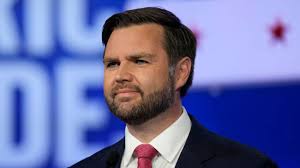At a worldwide summit in Paris, the United States and the United Kingdom did not sign an international accord on artificial intelligence (AI).
Among other nations, France, China, and India have signed the statement, which promises a “open,” “inclusive,” and “ethical” approach to the development of the technology.
Downing Street stated that the UK would “only ever sign up to initiatives that are in UK national interests” and that it “hadn’t been able to agree all parts of the leaders’ declaration.”
AI may “kill a transformative industry just as it’s taking off” if it is overregulated, US Vice President JD Vance had warned delegates in Paris earlier.
Vance urged international leaders that “pro-growth AI policies” should take precedence over safety and that AI was “an opportunity that the Trump administration will not squander.”
According to him, this would necessitate legislation that “rather than strangles it” but promotes AI research.
European leaders, in particular, should “look to this new frontier with optimism, rather than trepidation,” Vance continued.
French President Emmanuel Macron, who justified the necessity for additional regulation, seemed to disagree with his remarks.
During the meeting, Macron stated, “These regulations are necessary for AI to advance.”
In November 2023, then-prime minister Rishi Sunak hosted the first-ever AI Safety Summit, demonstrating the UK’s prior support for the concept.
According to Andrew Dudfield, Head of AI at the fact-checking group Full Fact, that was put in peril by the government’s refusal to ratify the Paris Agreement.
“By refusing to sign today’s international AI Action Statement the UK Government risks undercutting its hard-won credibility as a world leader for safe, ethical and trustworthy AI innovation” , according to him.
What does the agreement say?
The statement signed by 60 countries says the summit has affirmed to reducing digital divides by promoting AI accessibility, and ensuring it is “transparent”, “safe” as well as “secure and trustworthy”, among other aims.
“Making AI sustainable for people and the planet,” is listed as a further priority.
The agreement also notes that AI energy use – which experts have warned could rise to use as much as small countries in years to come – was discussed at a Summit for the first time.
Addressing the UK’s decision not to sign it, the Prime Minister’s official spokesperson told reporters that “these discussions are pretty live” and noted that the UK has “worked closely with the French throughout this process”.
“They remain one of our closest partners in all areas of AI,” they stated.
It coincides with debates over how the advancement of AI would affect governance, the environment, and society.
While addressing the concerns associated with AI, policymakers, business leaders, and diplomats at the Paris meeting have been considering strategies to harness the technology’s economic potential.
Macron started it by sharing a collection of humorous deepfake videos of himself in well-known movies and TV shows on social media.
“This summit is focused on action, and that is exactly what we need right now,” Ursula von der Leyen, president of the European Commission, stated Tuesday.
The meeting is also occurring at a time of increasing trade tensions between the US and Europe, she said, saying that Europe’s approach to AI, which has been promoted throughout the summit, would also emphasize innovation, collaboration, and “embrace the power of open source” technology.
President Tump has decided to impose tariffs on steel and aluminum imports into the US, a move that will affect the UK and EU. It is understood that the UK will not immediately retaliate, as it seeks to tread a delicate path of maintaining good relations with the Trump administration while also fostering closer ties with the EU.
Analysis: A fragmented global community
Several members of the world luminaries who had gathered to hear JD Vance’s speech—his first foreign appearance since being elected US vice president—sat stonily as he laid out the US viewpoint in a very direct manner.
ICYMT: Hakeem Adae Wins Central Region Council of State Election
They obviously didn’t want to hear it.
Whether you like it or not, Vance did not mince words in the speech, which was a clear demonstration of his strength.
Global “hand-wringing” over AI safety was rejected by him. “I’m not even here to talk about it,” he said at the start of his speech.
Across the Atlantic, the emphasis is firmly on drill, baby, drill, even if safety is a major topic of discussion in Europe and the UK and is even one of the key themes of the AI Action Summit.
“By building,” Vance declared, “the AI future will be won.”
Vance was eager to remind the world that, in its opinion, the US is very much in command, and the Trump administration plans to maintain it that way. There has been a lot of competition for dominance in the field of artificial intelligence here in Paris.
As every nation pursues its own AI agenda, it serves as a potent metaphor of the growing fragmentation of the global community.
SOURCE: BBC

























